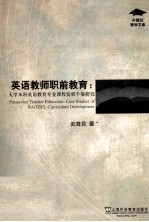图书介绍
英语教师职前教育 大学本科英语教育专业课程发展个案研究PDF|Epub|txt|kindle电子书版本网盘下载

- 武尊民著 著
- 出版社: 上海:上海外语教育出版社
- ISBN:9787544620109
- 出版时间:2011
- 标注页数:376页
- 文件大小:7MB
- 文件页数:193页
- 主题词:英语-语言教学-教学研究-师范大学
PDF下载
下载说明
英语教师职前教育 大学本科英语教育专业课程发展个案研究PDF格式电子书版下载
下载的文件为RAR压缩包。需要使用解压软件进行解压得到PDF格式图书。建议使用BT下载工具Free Download Manager进行下载,简称FDM(免费,没有广告,支持多平台)。本站资源全部打包为BT种子。所以需要使用专业的BT下载软件进行下载。如BitComet qBittorrent uTorrent等BT下载工具。迅雷目前由于本站不是热门资源。不推荐使用!后期资源热门了。安装了迅雷也可以迅雷进行下载!
(文件页数 要大于 标注页数,上中下等多册电子书除外)
注意:本站所有压缩包均有解压码: 点击下载压缩包解压工具
图书目录
CHAPTER 1 INTRODUCTION1
1.1 The Research Problem1
1.2 Background3
1.3 Significance of the Study8
1.4 Definition of Terms9
1.5 Organization of Thesis10
CHAPTER 2 LITERATURE REVIEW Ⅰ: EFL TEACHER EDUCATION12
2.1 Concepts and Issues in EFL Teacher Education12
2.1.1 Teacher Training and Teacher Education12
2.1.2 Theoretical Issues13
2.1.3 Teacher Knowledge Base and Competencies15
2.2 Development and Research22
2.2.1 EFL Teacher Education Development22
2.2.2 Approaches and Models24
2.2.3 Research in Language Teacher Education27
2.3 EFLTeacher Education in China29
2.3.1 General Background Situation30
2.3.2 EFL Teacher Education and Research35
2.4 Summary42
CHAPTER 3 LITERATURE REVIEW Ⅱ: CURRICULUM AND CURRICULUM STUDIES44
3.1 Definitions44
3.1.1 Curriculum45
3.1.2 Goals and Objectives46
3.1.3 Curriculum Organization47
3.1.4 Curriculum Planning50
3.1.5 Stakeholders50
3.2 Curriculum Development52
3.2.1 Curriculum Planning Process52
3.2.2 Needs Analysis57
3.2.3 Roles of Participants60
3.2.4 Research64
3.3 Evaluation66
3.3.1 Concepts,Approaches and Procedures66
3.3.2 Evaluation Research68
3.4 Curriculum Studies in China70
3.4.1 Teacher Education Institutions and Their Curricula70
3.4.2 Studies in Curriculum Development72
3.5 Summary77
CHAPTER 4 RESEARCH METHODS78
4.1 Research Design78
4.2 Participants80
4.2.1 Cases80
4.2.2 Research Liaisons82
4.2.3 Stakeholders82
4.3 Instrumentation85
4.3.1 Design of the Interview Protocols86
4.3.2 Design of the Questionnaire89
4.3.3 Documents90
4.4 Data Collection Procedures90
4.4.1 Case Site Visits92
4.4.2 Interviews94
4.4.3 Administration of the Questionnaire Survey97
4.4.4 Collection of Documents97
4.5 Data Processing Procedures98
4.5.1 Processing Qualitative Data98
4.5.2 Processing Quantitative Data102
4.5.3 Modes of Analysis102
4.6 Research Trustworthiness103
4.6.1 Research Validity104
4.6.2 Research Reliability107
4.7 Research Ethics108
4.8 Limitations109
4.9 Summary109
CHAPTER 5 FINDINGS OF CASE A111
5.1 Profile112
5.1.1 The University112
5.1.2 The Department of Foreign Languages and Literature114
5.1.3 The BA/TEFL Program116
5.2 Curriculum Development Process121
5.2.1 Regular Revisions122
5.2.2 Ad hoc Adjustments125
5.2.3 Other Factors Affecting Curricular Decisions126
5.3 Curricular Structure128
5.3.1 Curriculum Objectives129
5.3.2 Curriculum Organization130
5.4 The BA/TEFL Program: Perceptions of the Stakeholders133
5.4.1 Program Heads134
5.4.2 Teacher Educators138
5.4.3 Student Teachers142
5.4.4 Past Graduates165
5.4.5 End-Users188
5.5 Summary193
CHAPTER 6 FINDINGS OF CASE B197
6.1 Profile198
6.1.1 The University198
6.1.2 The Department of Foreign Languages and Literature200
6.1.3 The BA/TEFL Program201
6.2 Curriculum Development Process206
6.2.1 Regular Revisions207
6.2.2 Ad hoc Adjustments209
6.2.3 Factors Affecting Curricular Decisions210
6.3 Curricular Structure213
6.3.1 Curriculum Objectives215
6.3.2 Curriculum Organization215
6.4 The BA/TEFL Program: Perceptions of the Stakeholders219
6.4.1 Program Heads219
6.4.2 Teacher Educators221
6.4.3 Student Teachers225
6.4.4 Past Graduates247
6.4.5 End-Users270
6.5 Summary275
CHAPTER 7 CROSS-CASE ANALYSIS AND DISCUSSION279
7.1 Process of Curriculum Planning and Development279
7.1.1 Curriculum Processes279
7.1.2 The Role of the Stakeholders281
7.1.3 Possible Gaps284
7.2 Comparison of the BA/TEFL Programs289
7.2.1 Program Attributes289
7.2.2 Curriculum Planning292
7.2.3 Program Graduates in Teaching298
7.2.4 Stakeholders' Perceptions of Preservice Preparation300
7.3 EFLTeacher Knowledge Base and Competencies302
7.3.1 Perceived EFL Teacher Qualities302
7.3.2 EFL Teacher Knowledge and Competencies Perceived305
7.3.3 Possible Gaps307
7.4 Summary308
CHAPTER 8 CONCLUSION AND IMPLICATIONS310
8.1 Summary of Research Findings311
8.1.1 Processes of Curriculum Planning and Development311
8.1.2 Roles of Stakeholders in the Processes312
8.1.3 Program Recipients' Perceptions of EFL Teacher Preparation312
8.1.4 Secondary EFL Teacher Qualities and Competencies315
8.2 Implications for BA/TEFL Curriculum Design and Development316
8.2.1 Procedures316
8.2.2 Program Goals and Objectives321
8.2.3 A Framework for BA/TEFL Program Goals and Objectives321
8.2.4 BA/TEFL Curriculum Organization and Implementation323
8.3 Suggestions for Further Research324
8.3.1 EFL Teacher Knowledge Base for China's Secondary Schools324
8.3.2 An Integrated Curriculum324
8.3.3 The Implementation of an EFL Teacher Education Curriculum325
8.3.4 The Professional Development of Teacher Educators325
References326
Appendix A340
Appendix B344
Appendix C347
Appendix D350
Appendix E353
Appendix F356
Appendix G368
Appendix H370
Appendix I373